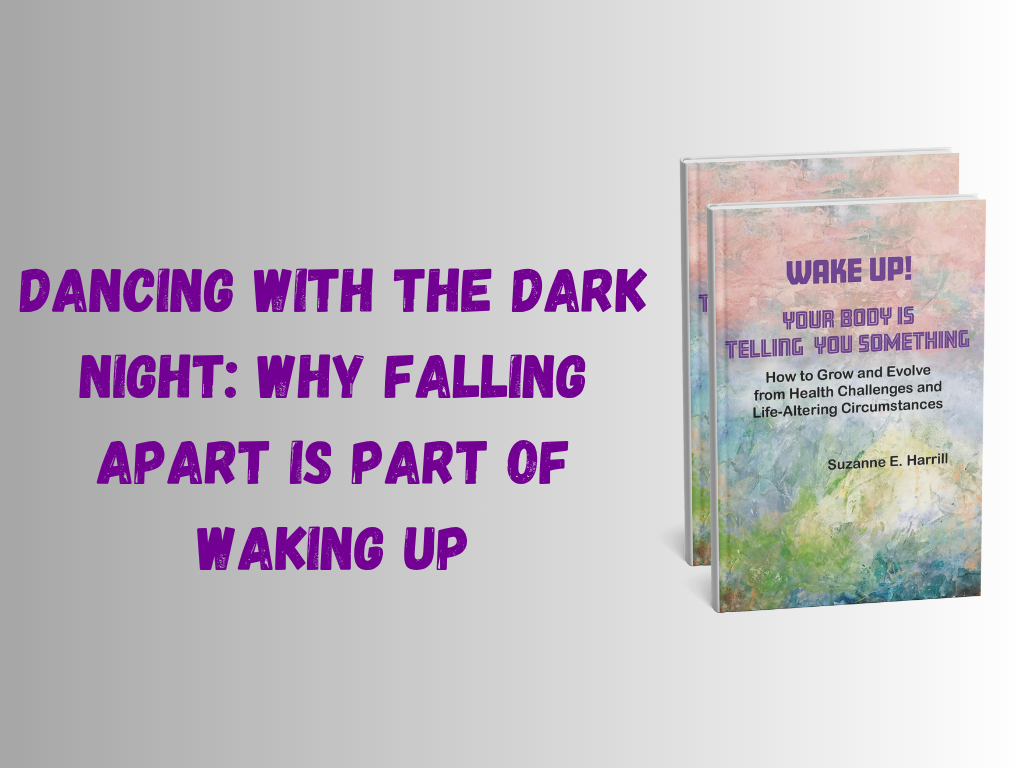Nobody likes to talk about it: the season when everything feels like it’s falling apart.
The sleepless nights. The loss you didn’t see coming. The way the floor disappears under your feet when the diagnosis, the breakup, or the unexpected phone call hits.
We call it depression, despair, burnout, grief. Suzanne E. Harrill refers to it differently in her book, Wake Up! Your Body Is Telling You Something. She dares to frame these raw experiences as what mystics have named for centuries: the Dark Night of the Soul.
And here’s the radical twist: Harrill doesn’t see the night as a failure. She sees it as an initiation.
What the “Dark Night” Really Means
St. John of the Cross first wrote about the night hundreds of years ago, describing it as a painful stripping away of illusions. Jung echoed the idea in psychology, referring to it as an encounter with the shadow. Even poets like Rumi wove suffering into their visions of awakening.
Harrill picks up that thread and brings it into modern life. To her, the night isn’t punishment or evidence that something’s “wrong” with you. It’s the moment life stops letting you run on autopilot. It’s where your old stories burn down and you’re forced to face yourself in the ashes.
That sounds brutal. And it is. But it’s also profoundly human.
Harrill’s Own Breaking Points
Harrill doesn’t write about suffering from a safe distance. She shares the devastation of family tragedy and the heavy weight of grief that followed. She speaks candidly about how illness stripped away her sense of control.
Instead of glossing over these experiences, she names them for what they were: doorways. Painful, jagged, terrifying doorways. But doorways nonetheless. Each breaking point cracked her open to a more profound compassion, not just for herself, but for others walking through their own storms.
Reading her story feels like sitting with someone who won’t pretend everything’s fine but also won’t let you believe despair is the end of the road.
Why Falling Apart Is Part of Waking Up
Think about it: growth rarely happens when life is easy. We expand when our comfortable structures crumble. We learn resilience when we have no choice but to rebuild. We discover compassion when we’ve tasted suffering ourselves.
Harrill compares it to a spiral. The same challenges may reappear, but each time we meet them, we’re on a higher turn of the spiral, with more wisdom and perspective. Falling apart doesn’t mean we’re back at square one. It means we’re being invited to rise in a different way.
Tools for Navigating the Dark Night
The night isn’t something you can bypass. But you don’t have to wander it alone. Harrill offers practical tools to navigate the shadows without getting lost:
- Journaling for honesty. Please write down the truths you’re afraid to say out loud: the anger, the grief, the confusion. Naming the storm gives it less power.
- Shadow work. Ask: What parts of myself am I afraid to look at? What am I denying? These questions, while uncomfortable, bring hidden patterns into light.
- Support systems. Harrill emphasizes that healing isn’t a solo sport. Support groups, trusted friends, and therapists’ connections are what keep us tethered when despair tempts us to isolate.
- Gentle practices. Small rituals, such as affirmations, breathwork, or simply taking a walk outside, remind us that even in darkness, life continues to move forward.
These aren’t fixes. They’re anchors. They keep you from sinking when the waves are high.
Readers Find Resonance
Many readers have described Harrill’s work as “a relief, finally someone telling the truth about suffering”. Others have praised her mix of vulnerability and practicality, saying the book “feels like a hand on your shoulder in the middle of the storm.”
She isn’t offering clichés like “just think positive.” She doesn’t say that the suffering isn’t real, but she does remind you that there is light at the end of the tunnel. Readers trust her because she is honest and hopeful at the same time.
If You’re in the Dark Right Now
Maybe you’re reading this while navigating grief that feels unbearable. Perhaps you’ve been knocked sideways by illness. Maybe you’re just tired of pretending you’re okay when you’re not.
Here’s Harrill’s message for you: you are not broken. You are in training.
The night isn’t a sign of weakness. It’s a stage in awakening. And while it feels endless, it will not last forever. On the other side of it is a version of you that knows yourself more deeply, loves more fully, and sees life with clearer eyes.
A Small Step You Can Take Today
If you’re feeling lost, ask yourself a simple question: What is this darkness attempting to teach me?
Don’t put pressure on yourself to come up with an answer right away. Please write it down. Sit with it. Let the inquiry dangle in the air like a light. Sometimes, just asking is all it takes to change how we feel about our pain.
Closing Thoughts
Suzanne E. Harrill’s Wake Up! Your Body Is Telling You Something doesn’t sugar-coat suffering. It doesn’t offer quick fixes. What it offers instead is companionship, wisdom, and practical guidance for anyone brave enough to walk through the night and emerge brighter on the other side.
If you’re ready to reframe falling apart as part of waking up, grab your copy of Wake Up! Your body is telling you something today [insert retailer link]. Because even in the deepest night, your soul is still reaching for the dawn.
